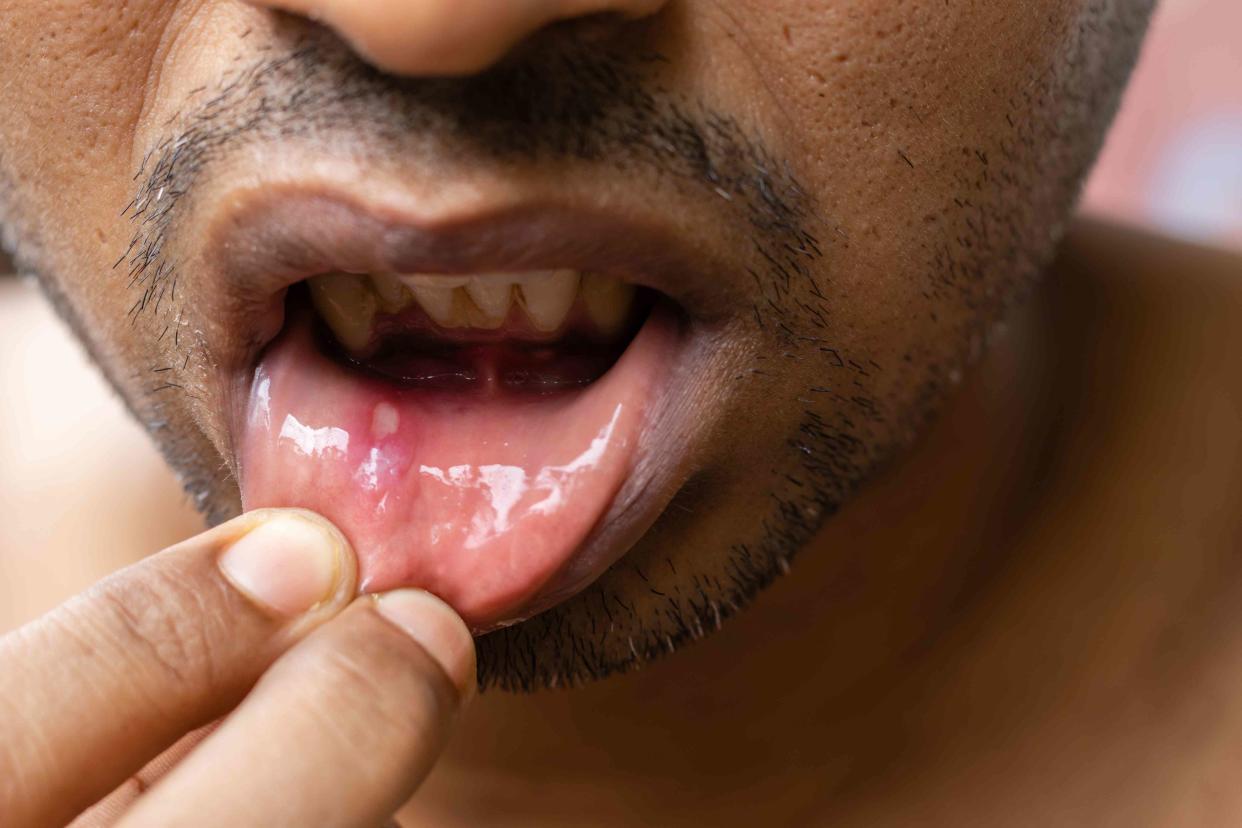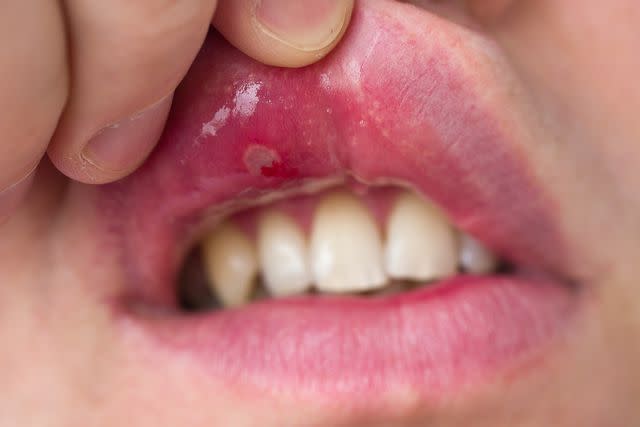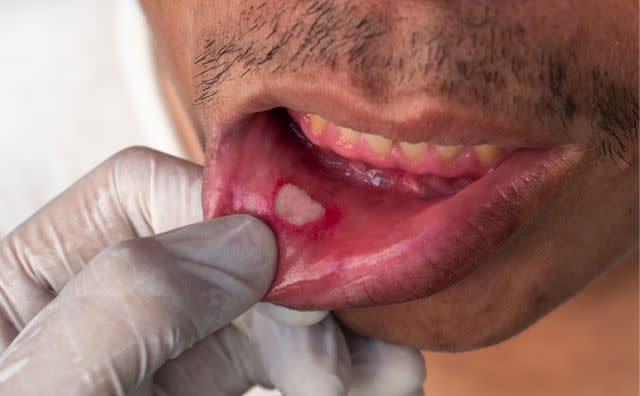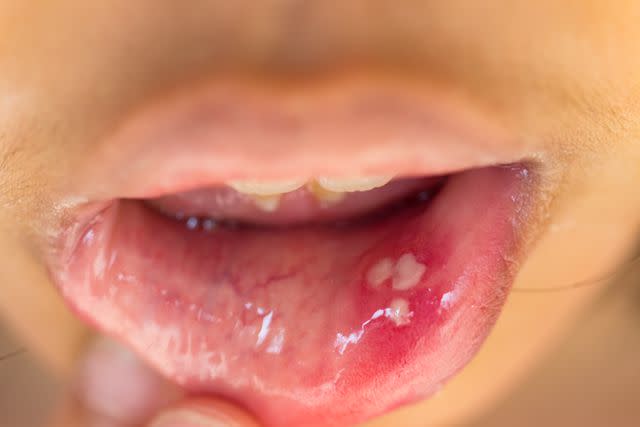What Are Canker Sores?

Soumen Hazra / Getty Images
Medically reviewed by John Carew, MD
A canker sore, or aphthous ulcer, is a small round or oval-shaped sore that develops inside the mouth, including the tongue, cheeks, lips, or on the roof of the mouth. Canker sores have a white or gray center with a red border and are often painful, especially when talking, eating, or brushing your teeth.
While canker sores can be bothersome and uncomfortable, they are not contagious and do not pose a serious health risk. Although the exact cause of canker sores is unknown, factors such as stress, injury to the mouth, hormonal changes, and nutritional deficiencies can contribute to their development. Most canker sores heal within one to two weeks, and treatments—including topical medications and mouth rinses—can help relieve pain and promote healing.
Canker sores often first appear during adolescence and affect 5 to 50% of the population.
Types and Photos
There are three types of canker sores: minor aphthous stomatitis, major aphthous stomatitis, and herpetiform aphthous stomatitis. The term "stomatitis" is used to describe inflammation of the mucus membranes in your mouth. Canker sores are classified based on the size and number of sores you have and how long they take to heal.
Minor Aphthous Stomatitis
This is the most common type of canker sore, accounting for about 80% of all cases. Minor aphthous stomatitis is characterized by small, round, or oval-shaped sores that are usually less than 1 centimeter (cm) in diameter. They typically heal within a week without leaving scars.

epifan_vn / Getty Images
Major Aphthous Stomatitis
This type of canker sore is more severe and accounts for approximately 15% of all cases. Major aphthous sores are usually deep and larger than 1 cm in diameter. These sores may take two weeks or longer to heal and can leave scars.

Zay Nyi Nyi / Getty Images
Herpetiform Aphthous Stomatitis
Herpetiform aphthous stomatitis is the least common type of canker sore, accounting for less than 5% of all cases. People with this type will have multiple tiny sores that appear in clusters. These sores are not caused by the herpes virus. Sores can merge, forming larger irregular-shaped ulcers, usually healing in a week.

frank600 / Getty Images
Canker Sore Symptoms
A day or two before canker sores form, you may feel a tingling or burning sensation in the area where the canker sore will appear. A canker sore is most likely to develop on:
The tongue, under the tongue, or tip of the tongue
Inside the cheek
The roof of the mouth
The inside of the lip(s)
On the gum tissue
Once a canker sore develops, symptoms may include:
Painful, circle or oval-shaped red spots that develop into an ulcer with a white or yellow center
Fever
Malaise (general discomfort)
Swollen lymph nodes
Canker sore pain usually lasts ten days, though it can take up to three weeks for a canker sore to heal completely.
What Causes Canker Sores?
Canker sores develop when the delicate tissues inside the mouth become damaged or irritated. Researchers aren't sure why canker sores develop, but they may result from an immune system response after exposure to certain substances, irritants, or injuries such as:
Injury or trauma to the mouth (e.g., dental work, wearing braces, having ill-fitting dentures)
Certain foods, such as citrus fruits or cheese
Hormonal changes during pregnancy and menstruation
Nutritional deficiencies
Risk Factors
Canker sores are among the most common oral conditions. Anyone can develop canker sores, but certain risk factors may make you more susceptible, including:
Genetics: Canker sores run in families; 24% to 46% of people who develop canker sores have family members who also get them.
Sex: Women are more likely to develop canker sores than men.
Certain health conditions: Some medical conditions can increase the risk of canker sores, including human immunodeficiency virus (HIV), gastrointestinal disorders (e.g., inflammatory bowel disease), or certain cancers (e.g., mouth, pancreas, breast).
Diagnosis
Canker sores can be diagnosed by looking in your mouth to identify the sore. If you have frequent canker sores or sores that do not heal within a week or two, your healthcare provider may order diagnostic tests to determine the cause, such as food allergies or infection.
These tests may include:
Culture: Your healthcare provider will gently swab the area surrounding the sore and send the swab to the lab to check for infection.
Biopsy: A small tissue sample (biopsy) may be taken with a swab and sent to the lab for analysis to rule out other possible causes of canker sores, such as oral cancer. While canker sores do not cause cancer, some oral cancers can cause mouth ulcers that do not heal.
Allergy testing: If there is reason to believe certain foods may trigger canker sores, allergy tests can help identify sensitivities to specific substances.
Treatments for Canker Sores
Most canker sores heal without treatment within one to two weeks. Over-the-counter treatments and lifestyle modifications can help relieve symptoms until the canker sore has healed. For severe canker sore outbreaks, your healthcare provider may prescribe medications for pain relief.
Lifestyle Modifications
At-home remedies and lifestyle modifications can help you manage the pain and discomfort of canker sores while you wait for them to heal. To relieve canker sore pain at home, you can try the following:
Eating soft, bland foods that do not require a lot of chewing and are easy to swallow, such as yogurt or cottage cheese. Avoid spicy or acidic foods (e.g., citrus fruits, tomatoes) to avoid irritating the canker sore.
Saltwater rinses: Mix one teaspoon of salt into 1 cup of warm water and swish the solution in your mouth to help reduce pain and inflammation.
Brush your teeth gently with a soft-bristled toothbrush.
Drinking cold fluids, such as iced water or tea, may help numb the pain. Using a straw can help keep the liquid from touching the canker sore if the fluid makes it sting.
Avoid smoking or chewing tobacco, which can irritate canker sores.
Over-The-Counter Medications
Over-the-counter medicines can help temporarily relieve pain and discomfort. Most drugstores carry items that may help manage canker sore symptoms, such as:
Topical medications: Ointments, gels, or mouth rinses containing ingredients such as benzocaine (the active ingredient in Orabase) or lidocaine can help numb the affected area and relieve pain.
Pain relievers: Over-the-counter pain relievers, including Tylenol (acetaminophen) or Advil (ibuprofen), can reduce canker sore pain and inflammation.
Milk of magnesia: Sold as a laxative or antacid (heartburn) medicine, milk of magnesia applied directly to the sore up to four times a day may offer pain relief.
Aloe vera gel: Aloe vera gel dabbed gently onto the sore may help promote healing and relieve pain.
Prescription Medications
If you have recurrent (frequent) canker sores or multiple canker sores that are severe enough to prevent you from eating or drinking, your healthcare provider may prescribe medicines to help soothe the pain. These medicines may include corticosteroids and mouth rinses.
Corticosteroids applied directly to the sore(s) or taken by mouth can help reduce inflammation and pain. Commonly prescribed medications include topical numbing agents like Xylocaine (viscous lidocaine), corticosteroids such as Vanos (fluocinonide gel) and Dermovate (clobetasol gel), and topical disinfectants like Gly-Oxide (carbamide peroxide oral).
A mouthwash containing corticosteroids such as dexamethasone may be prescribed to ease the pain and reduce swelling if you have a severe outbreak of canker sores throughout your mouth.
Related: How To Treat a Canker Sore
Prevention
While there is no foolproof method to prevent canker sores, certain measures may help reduce your risk of developing them:
Maintain good oral hygiene by brushing your teeth with a soft-bristled toothbrush, flossing, and using a mild, alcohol-free mouthwash
Avoid foods that trigger or worsen canker sores, such as acidic and spicy foods
Identify and avoid any specific allergens or irritants that have previously caused canker sores
Manage stress levels through stress-reduction techniques, such as medication, exercise, or spending time in nature
Protect your mouth from injury by avoiding habits like biting the insides of your cheeks or lips and using caution when consuming hot foods and beverages
Eat a well-balanced, nutrient-dense diet to prevent nutritional deficiencies
Complications
Canker sores are usually temporary and heal within one to two weeks without causing problems. In rare cases, canker sores can lead to complications, such as infections and scarring.
Infections can occur when the open sores are exposed to harmful microorganisms, such as bacteria or fungi.
Severe or large canker sores, particularly major aphthous stomatitis, can sometimes lead to scarring or tissue damage in the affected area. Scarring may cause changes in the texture and appearance of your mouth tissue.
Living With Canker Sores
Coping with canker sores can be frustrating, especially when they impact your ability to eat, drink, and talk. Finding ways to manage your pain and discomfort, such as eating soft foods and using topical numbing creams, can help you cope while you wait for your canker sore to heal.
Though it may be bothersome, continue good oral hygiene by gently brushing your teeth with a soft-bristled toothbrush and using a mild mouthwash. This can help promote healing and prevent oral infections.
Most canker sores heal within one or two weeks, but if your canker sore symptoms worsen or do not go away, see a healthcare provider for a diagnosis and treatment recommendations.
Frequently Asked Questions
Are canker sores caused by a virus?
No, viruses do not cause canker sores. Experts aren't sure what causes canker sores, but certain factors can contribute to the development of canker sores, such as mouth injuries, hormonal changes, stress, or certain foods (e.g., citrus fruits).
Should you brush your canker sores?
Avoid brushing directly on or over canker sores to prevent irritating and worsening the sore. Instead, you can apply over-the-counter topical numbing creams or gels directly to the sore to help relieve pain and discomfort.
What happens if I don't treat a canker sore?
Most canker sores will heal without treatment within one to two weeks. If your canker sore does not heal within two weeks, see a healthcare provider for proper diagnosis and treatment to prevent complications.
How long should I wait for a canker sore to heal?
Canker sores usually heal within one to two weeks, but the healing time can vary depending on factors such as the size and location of the sore. If a canker sore persists beyond two weeks or causes significant pain or difficulty in daily activities, see a healthcare provider for evaluation and treatment.
For more Health.com news, make sure to sign up for our newsletter!
Read the original article on Health.com.

